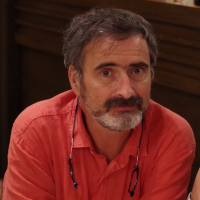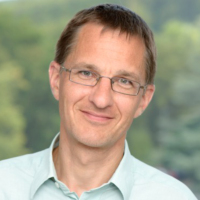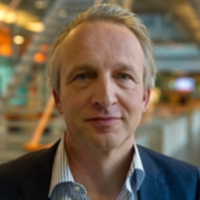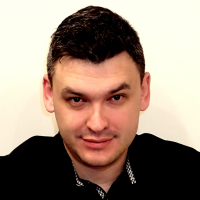Keynote speakers

Colin de la Higuera
Colin de la Higuera got his PhD at Bordeaux University in 1989. He has been associate Professor at the University of Montpellier, Professor at Saint-Etienne University and is now Professor at Nantes University. He has been involved in a number of research themes, including algorithmics, formal language theory, pattern recognition. His chief interest lies in grammatical inference, a field in which he has been the author of over 50 reviewed research and a monograph, “Grammatical Inference: Learning Automata and Grammars”, published in 2010. He has developed algorithms, studied learning models and has been trying to link classical formal language frameworks with alternative ways of defining languages, inspired by linguistic considerations or techniques developed in pattern recognition. He has been chairman of the International Community in Grammatical Inference (2002-2007), the founding president of the SIF, the French Informatics Society and is currently a trustee of the Knowledge for All foundation and is working towards the usage of technology for an open dissemination of knowledge and education.

Johannes Söding
Johannes Söding obtained his PhD in 1996 in laser cooling of neutral atoms at the MaxPlanck Institute for Nuclear Physics and did postdoctoral experimental work on Bose-Einstein condensation of neutral atoms at the École Normale Supérieure in Paris. After three years as consultant at the Boston Consulting Group, he returned to science in 2002. He started his career in bioinformatics with Andrei Lupas at the Max Planck Institute for Developmental Biology in Tübingen, working on protein evolution, remote homology detection and structure prediction. In 2007 he became an independent research group leader at the Gene Center of the University of Munich (LMU). Since 2014 he leads the research group Quantitative and Computational Biology at the Max Planck Institute for Biophysical Chemistry. His group develops statistical and computational methods for analyzing data from high-throughput biological experiments, in particular for protein function and structure prediction, sequence search and assembly in metagenomics, transcription regulation, gene regulatory networks, and systems medicine.

Frits Vaandrager
Frits Vaandrager is full professor within the Institute for Computing and Information Sciences of Radboud University Nijmegen. He received his PhD from the University of Amsterdam in 1990. After postdoc positions at MIT and at the École des Mines, he was group leader at the CWI in Amsterdam until his appointment in Nijmegen in 1995. Vaandrager has a strong interest in the development and application of theory, (formal) methods and tools for the analysis of computer-based systems. He has been and is involved in many projects in which formal methods, model checking and automata learning technology are applied to tackle practical problems from industrial partners. His publications have been cited more than 8.000 times and his h-index according to Google Scholar is 48. Currently, his main research interest is the use of active automata learning for obtaining models of software and hardware components.
Special guest

Gniewosz Leliwa
Gniewosz Leliwa is a chief science officer and co-founder of Fido.AI. In 2010, he left his academic career in quantum physics to work on artificial intelligence and natural language understanding. Since then, he has been working as an architect and lead engineer on Fido's core technology – Language Decoder, an automatic knowledge acquisition framework. At present, he puts his effort into applying Language Decoder to build self-explanatory contextual models for combating online violence. Author of three AI-related patents. His work and research interests focus on the third wave of AI – contextual adaptation (according to DARPA's classification).